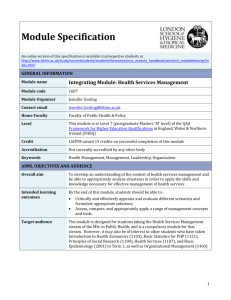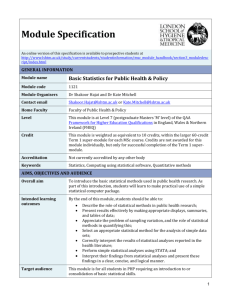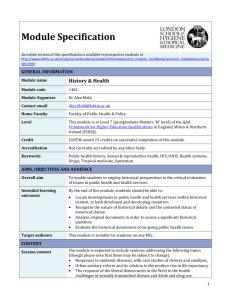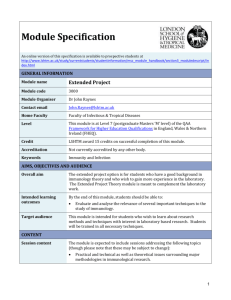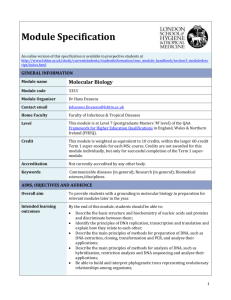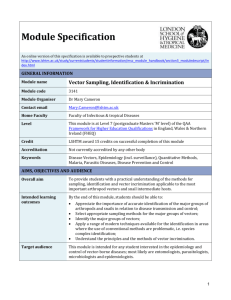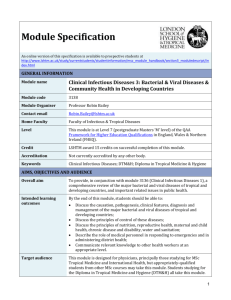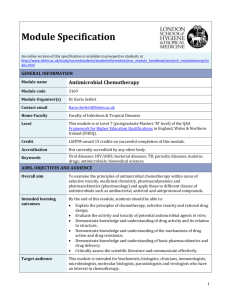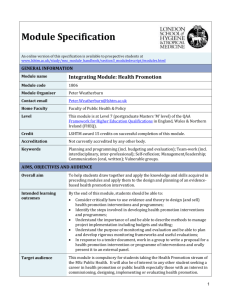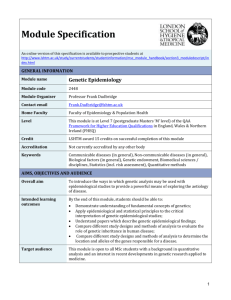3457 Designing Disease Control Programmes in Develeoping
advertisement
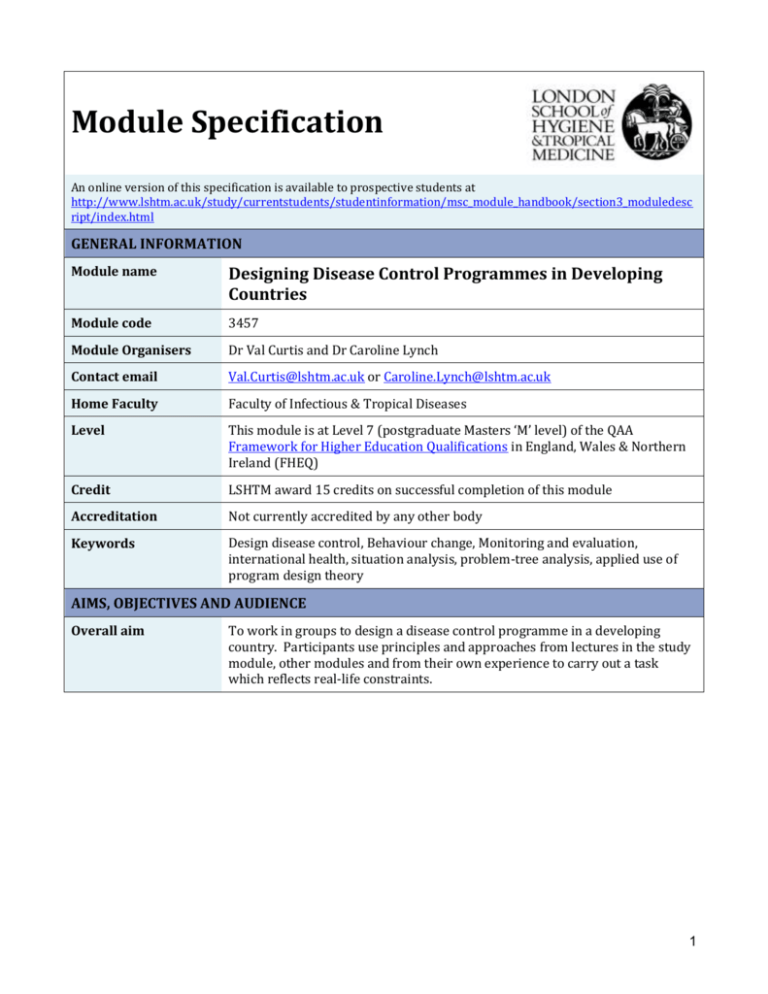
Module Specification An online version of this specification is available to prospective students at http://www.lshtm.ac.uk/study/currentstudents/studentinformation/msc_module_handbook/section3_moduledesc ript/index.html GENERAL INFORMATION Module name Designing Disease Control Programmes in Developing Countries Module code 3457 Module Organisers Dr Val Curtis and Dr Caroline Lynch Contact email Val.Curtis@lshtm.ac.uk or Caroline.Lynch@lshtm.ac.uk Home Faculty Faculty of Infectious & Tropical Diseases Level This module is at Level 7 (postgraduate Masters ‘M’ level) of the QAA Framework for Higher Education Qualifications in England, Wales & Northern Ireland (FHEQ) Credit LSHTM award 15 credits on successful completion of this module Accreditation Not currently accredited by any other body Keywords Design disease control, Behaviour change, Monitoring and evaluation, international health, situation analysis, problem-tree analysis, applied use of program design theory AIMS, OBJECTIVES AND AUDIENCE Overall aim To work in groups to design a disease control programme in a developing country. Participants use principles and approaches from lectures in the study module, other modules and from their own experience to carry out a task which reflects real-life constraints. 1 Intended learning outcomes By the end of this module, students should be able to: Target audience Identify key steps in applying theoretical knowledge to define and solve a practical public health problem in a given developing country setting, using the Logical Framework Approach and Theory of Change; Summarize and evaluate appropriate epidemiological information and stratify the health problem for the purpose of setting priorities and selecting appropriate interventions; Carry out a critical appraisal of different control options and select appropriate interventions; Set priorities and formulate appropriate objectives; Describe how to organize a disease control programme and plan specific activities to reach set objectives and targets; Describe how to build an effective monitoring and evaluation system into a disease control programme; Demonstrate skills of costing and budgeting of programme activities and identify key requirements and constraints of externally funded programmes; and Acquire group working skills. This module is best for those who will work in disease control in developing countries. Past participants have come from a wide variety of MScs including Public Health in Developing Countries, Control of Infectious Diseases, Tropical Medicine & International Health, Epidemiology, and Demography & Health. CONTENT Session content The module is expected to include sessions addressing the following topics (though please note that these may be subject to change): Situational analysis Logical Framework and Problem-tree analysis Options for disease interventions Behaviour Change Communication Monitoring and Evaluation Budgeting for projects Group work and collaboration exercises Technical forum: Experiences from the field TEACHING, LEARNING AND ASSESSMENT Study resources provided or required Course folder provided with required reading and supplementary (open access) materials links provided. Online tools e.g. videos or talks via Moodle 2 Teaching and learning methods Participants learn through the definition, study, and solution of a problem in groups. To the extent possible, the preferences of participants for control problems are considered in choosing the groups. Lectures are kept to a minimum (only 7 hours). Lectures cover some practical aspects of programme planning but the emphasis is on the development of practical skills through group work. Facilitators are provided for expert consultation only when requested by the groups but they are usually not expected to spend more than one hour per group per week. Therefore, most of the organization, management, and approach of each group are determined by its participants. Assessment details Participants are assessed on (i) their group's final document (60%) of the overall grade for this module) and (ii) assessment by peers (20%) of the overall grade for this module) and iii) an individual assessment (20%) The written group report will have a maximum length of 20 pages. For students who are required to re-sit, or granted a deferral or new attempt, the task is to critique the design of a disease control project proposal. Assessment dates Assessments will take place or be due on 10 February 2016. For students who are required to re-sit, or who are granted a deferral or new attempt, the next assessment deadline will be notified by the Module Organiser, but there is usually a standard School-recommended date in mid/late September for this. Language of study and assessment English (please see ‘English language requirements’ below regarding the standard required for entry). TIMING AND MODE OF STUDY Duration The module runs for 5 weeks at 2.5 days per week; this module runs between Monday morning and Wednesday lunchtime Dates For 2015-16, the module will start on Monday 11 January 2016 and finish on Wednesday 10 February 2016. Timetable slot The module runs in LSHTM timetable slot C1 Mode of Study The module is taught face-to-face in London. Both full-time and part-time students follow the same schedule. For full-time students, other LSHTM modules are available in the other half of the week for the C and D slots. Learning time The notional learning time for the module totals 150 hours, consisting of: Contact time ≈ 25 hours Directed self-study ≈ 50 hours Self-directed learning ≈ 30 hours Assessment, review and revision ≈45 hours APPLICATION, ADMISSION AND FEES Pre-requisites No pre-requisite modules 3 English language requirements A strong command of the English language is necessary to benefit from studying the module. Applicants whose first language is not English or whose prior university studies have not been conducted wholly in English must fulfil LSHTM’s English language requirements, with an acceptable score in an approved test taken in the two years prior to entry. Applicants may be asked to take a test even if the standard conditions have been met. Student numbers Student numbers are typically 30-40 per year; numbers may be capped due to limitations in facilities or staffing. Student selection Preference will be given to LSHTM MSc students and LSHTM research degree students. Other applicants meeting the entry criteria will usually be offered a place in the order applications are received, until any cap on numbers is reached. Full Registration (full participation) by LSHTM research degree students is required for this module. Fees For registered LSHTM MSc students, fees for the module are included within MSc fees (given on individual course prospectus pages). If registering specifically for this module, as a stand-alone short course, individual module fees will apply. Tuition fees must be paid in full before commencing the module, or by any fee deadline set by the Registry. Scholarships Scholarships are not available for individual modules. Some potential sources of funding are detailed on the LSHTM website. Admission deadlines For 2015-16: For registered LSHTM MSc students, the module choice deadline (for Term 2 and 3 modules) is Friday 20 November 2015. If registering specifically for this module, applications may be made at any time but, as places are limited, early application is recommended. All applications should be submitted by, at the latest, 8 weeks prior to the start of the module. Formal registration will take place on the morning of the first day of the module. ABOUT THIS DOCUMENT This module specification applies for the academic year 2015-16 Last revised 06 July 2015 by Caroline Lynch London School of Hygiene & Tropical Medicine, Keppel St., London WC1E 7HT. www.lshtm.ac.uk 4

